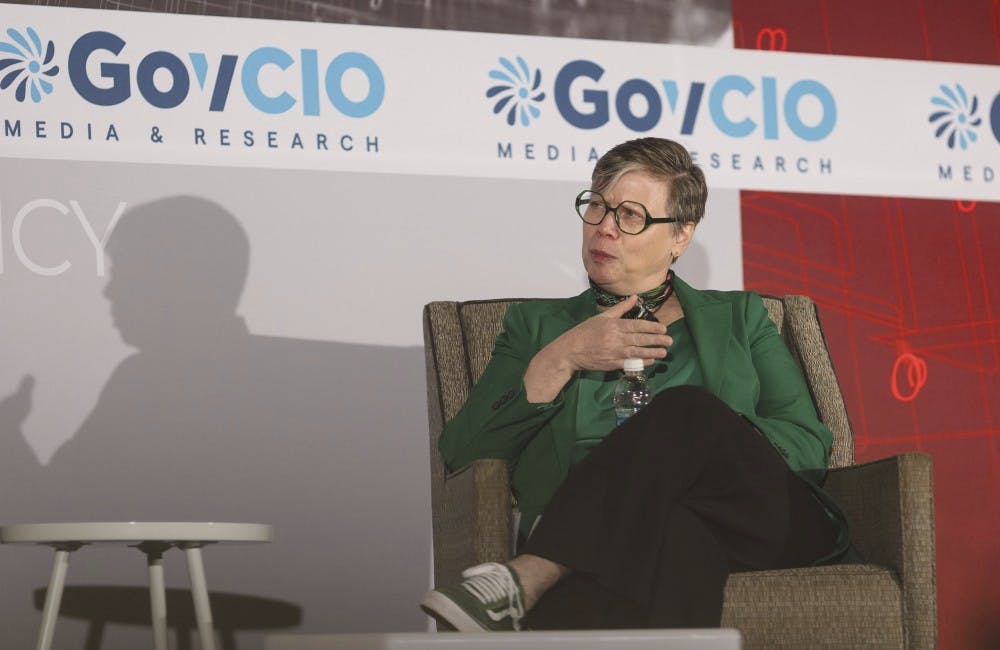Air Force Intel Chief Eyes Future of Quantum
Algorithmic development and multidisciplinary collaboration are key.

Successful quantum research and adoption in the U.S. Air Force will involve multi-disciplinary experts from around the world collaborating on applications for communications, IT, health care and beyond, said Ken Corigliano, the U.S. Air Force Chief of Intelligence.
“We must push further, deeper and know more about quantum phenomenon and subsequently our universe,” Corigliano said at ATARC’s Quantum Initiative Advisory Board launch Tuesday. “We must find the most audacious, auspicious and experimental efforts that seek to disrupt our assumptions of the laws of nature, and I dare to say we need to aggressively encourage competition.”
To move quantum forward into the future, Corigliano proposed three steps that he found critical, the first of which is to pursue algorithmic development in quantum, which will require the proper software to enable that pursuit.
“Dedicated specific dollars for quantum algorithmic development works for multiple things,” he said. “Computers, cryptography and communications cannot proceed without algorithms, and we focus on a secure supply chain and on the wetware and software to drive it.”
Developing proper hardware is also critical to enabling quantum algorithmic developments, he said. Classical computers currently limit the growth of quantum discovery, so as computers improve, it is critical to implement them in quantum research.
The second step in success in quantum is to fund the “forever clock,” Corigliano said. This clock, an atomic clock, is driven by quantum science and provides time with accuracy and precision. Former Chief Scientist for Quantum Hardware at Google and UC Santa Barbara Physics Professor Dr. John Martinis, who sits on the ATARC quantum advisory board, added that the atomic clock is also the closest instance of quantum commercialization that we’ll see.
The final step Corigliano stressed is to incentivize passive detection from a distance by using protons.
“This will allow the utility of time in internal navigation for multiple purposes,” Corigliano said of the last step. “This could assist us in detecting previously undetected phenomena, such as dark matter and dark energy, or other dimensions that are now only in the dreams or unprovable mathematical models on chalkboards of the most audacious physicists.”
In following these steps and continuing to collaborate across different disciplines, various industries and areas could see change because of quantum.
“We will discover incredible insights as to our own existence, the secrets of the universe, new ways of energy creation, new materials, medical breakthroughs, and — personally touching for me — is the artificial intelligence to help the blind see, the deaf hear, elderly to regain their independence and modeling the phenomena of nature like natural disasters and life forms,” he said.
Amid the vast areas of potential for quantum, Corigliano said that the Defense Department is keen to see precision navigation of timing improve from discoveries and implementation of quantum. Namely, he hopes to see it become “ultra-precision navigation” so that the military can achieve significant decisive advantages in situational awareness, systems deployments of long-range operations and threat detection.
Corigliano further stressed the role of artificial intelligence in the realm of quantum — particularly as algorithms improve. This is particularly in the case of encryption.
National Institute of Science and Technology Post-Quantum Cryptology Leader Dr. Lily Chen emphasized that quantum will create heightened cybersecurity challenges as it pushes the boundaries of cryptology. Her role in the working group will be to spearhead efforts to develop cryptosystems that are resistant to quantum attacks.
The other members of the group include U.S. Department of Agriculture Rural Development Deputy CIO Michael Gardner (who will oversee the tactical implementation of quantum), IBM Federal CTO Architect Gabe Chang, IARPA Program Manager Dr. Mark Heiligman and Honeywell Quantum Solutions President Tony Uttley.
This is a carousel with manually rotating slides. Use Next and Previous buttons to navigate or jump to a slide with the slide dots
-

Technology Modernization Drives a More Efficient Government
Federal agencies are modernizing tech, data and cybersecurity to streamline operations, boost efficiency and improve government services.
20m read -

Navy Lab's PROTEUS Provides AI-Powered Maritime Awareness
NRL's Alan Hope details how real-time data and AI are empowering agencies to track vessels, combat threats and enhance maritime domain awareness.
23m watch -

NCI Uses Wearables Data to Link Exercise to Cancer Risk
NCI finds a connection between low-intensity exercise and decreased risk of cancer through data collected from wearable technology.
9m listen -

Navy Software Optimization Journey Focuses on Efficiency
DOD and DOGE collaborate on initiative to cut waste and improve technology acquisition, DON deputy CIO says.
4m read








